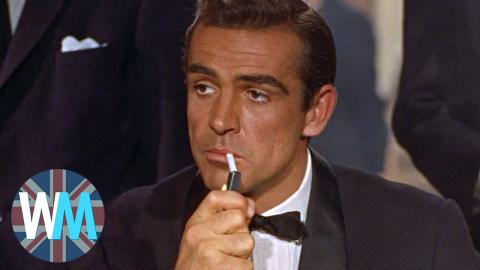Top 10 British Films That Changed Cinema Forever

Move over, America. These Brit flicks redefined the movie industry. Welcome to WatchMojo UK, and today we'll be counting down our picks for the top 10 British Movies Which Changed Cinema Forever.
For this list, we take a look at some of the British masterpieces that have influenced cinema worldwide and forever changed the way we experience movies.
Special thanks to our user WordToTheWes for submitting the idea on our interactive suggestion tool: WatchMojo.comsuggest
#10 “Dr. No” (1962)
There had been attempts to bring Ian Fleming’s 007 to the big screen before this, but “Dr. No” is the first Eon Productions effort, and widely regarded as the first true Bond movie. Introducing Sean Connery as the iconic super spy, Bond has become one of the world’s most recognisable and influential film characters. And ever since this historic introduction, the secret agent has battled larger than life villains, with guns, gadgets, cars and catchphrases to shape the series - and define the spy-thriller genre, in general.
#9 “Hamlet” (1948)
Laurence Olivier’s “Hamlet” still sets the benchmark for any cinematic Shakespeare adaptation. This version of the famous play is one of the most firmly planted in popular consciousness, particularly noted for Olivier’s tense rendition of the “To be or not to be” monologue, as well as some lavish settings and stand-out performances from the entire cast. The Bard still stands as inspiration for storytellers everywhere, and Olivier was a master at translating the playwright for film.
#8 “A Hard Day’s Night” (1964)
The Beatles certainly changed pop music forever, and they impacted film, too. “A Hard Day’s Night” rewrote the boundaries between music and the movies. Capturing the Beatles at the height of their fame in a whirlwind of cinematic inventiveness, Richard Lester directs an all-encompassing extravaganza giving fresh insight on the Fab Four, as they travel from Liverpool to a televised gig in London. Hilarious shenanigans ensue - and the soundtrack’s second to none!
#7 “The 39 Steps” (1935)
Alfred Hitchcock reached the peak of his fame while working in the US, thanks to classics including “Rear Window” and “Psycho”. But Hitchcock’s work began in Britain, and “The 39 Steps” could be considered as the apex of the first half of the director’s career. Regarded as a masterpiece by the likes of Orson Welles, the edge-of-seat story of espionage and murder proved one of the most important and influential thrillers of the century, becoming Hitchcock’s first great spy movie.
#6 “The Ladykillers” (1955)
From famed Ealing Studios, the home of classic British comedy, comes one of the wittiest, most brilliant and best-known productions in the genre, often described as one of the greatest British films ever made. Sporting an exceptional cast, including fan favourite Alec Guinness and the legendary Peter Sellers, “The Ladykillers” follows the misadventures of five oddball criminals and the old lady from whom they’re renting rooms, by pretending to be musicians. A laugh-out-loud black comedy, it has inspired countless films since.
#5 “Lawrence of Arabia” (1962)
This essential historical drama, based on the life and writings of T.E. Lawrence, an esteemed British officer in World War I, is a first port of call for fans of British film. David Lean, who at the time of shooting had already directed another great British war epic, “The Bridge on the River Kwai”, builds upon the complex man at the centre of his story with grand visuals and masterful performances from a star-studded cast. It’s an epic and then some!
#4: “Blow-Up” (1966)
Michelangelo Antonioni's finest foray into British cinema makes for one of the most beautiful and unnerving films ever set in London. A complex and challenging piece of art, with its explicit depictions of sex and drug use, this film directly contributed to the abolition of the Production Code in America - a set of moral guidelines for US movies, which stood until 1968. Charting a day in the life of a fashion photographer who believes he may have captured a murder on film, “Blow-Up” proved counterculture perfection, and remains a favourite for cinephiles worldwide.
#3: “The Life and Death of Colonel Blimp” (1943)
Of all the masterclasses that the Powell and Pressburger duo have given us, this was probably the most controversial - at least at the time of release. Earning heavy disapproval from the 1940s UK government, which didn't understand its particular shade of patriotism, “The Life and Death of Colonel Blimp” remains an unparalleled parable on love, friendship, war, and what it means to be English. It’s probably not as well known as “The Red Shoes” or “Black Narcissus”, but Powell and Pressburger ranked it as one of their best. And we wholeheartedly agree.
#2: “A Clockwork Orange” (1971)
A watershed moment for mainstream cinema, “A Clockwork Orange” is at its core a very British film. True, director Stanley Kubrick was American, but by ’71 he was working exclusively in Britain, also going on to make one of the UK’s finest period dramas, in “Barry Lyndon”.[1] But “Clockwork Orange” gives a grotesque and unique focus to violence, freedom and control which, though it was banned for decades, brought a brand new emphasis and direction to film. A wide-ranging rule-breaker, it forced international conversations on censorship, and the relationship between crime, psychology and the media.
#1: “The Third Man” (1949)
Universally recognised as a definitive film in its genre, “The Third Man” is the epitome of film noir. Written by Graham Greene, one of the most English authors of the twentieth century, and directed by Carol Reed, it stars Orson Welles in one of his most memorable (and menacing) performances. Set in post-World War II Vienna, “The Third Man” sports an expressionist black and white look which would go on to inspire generations of film noir cinematographers, as well as countless contemporary classics.

